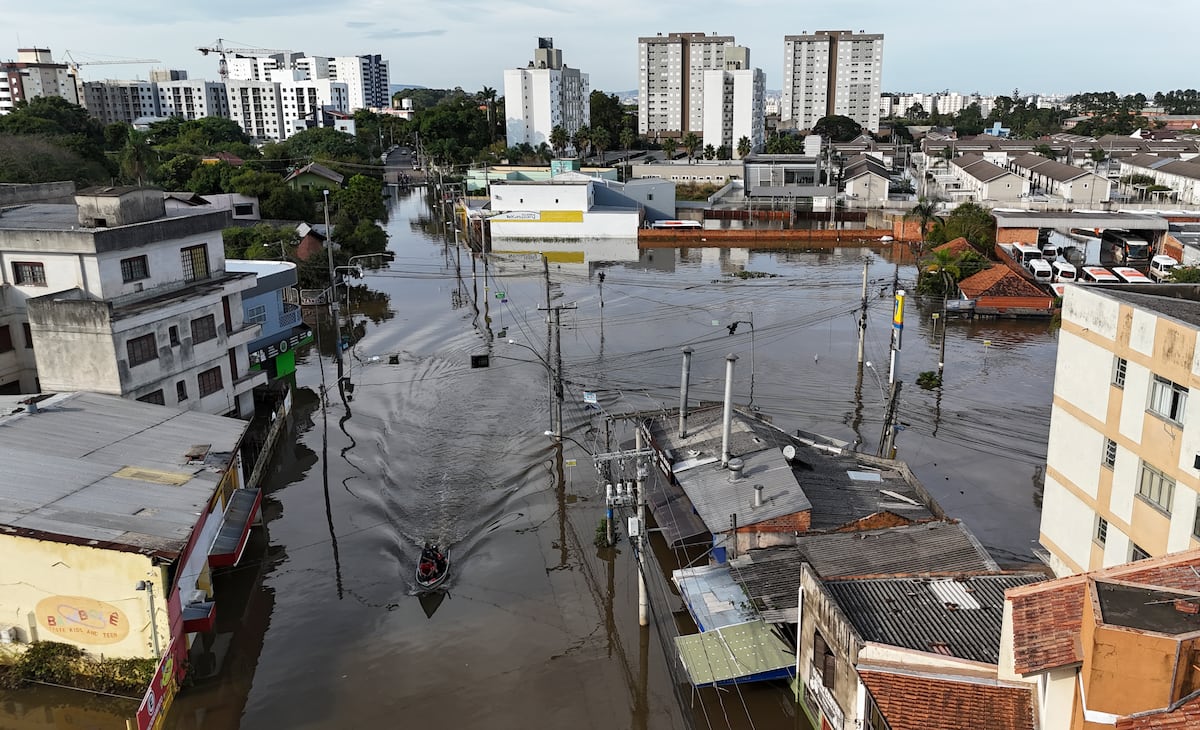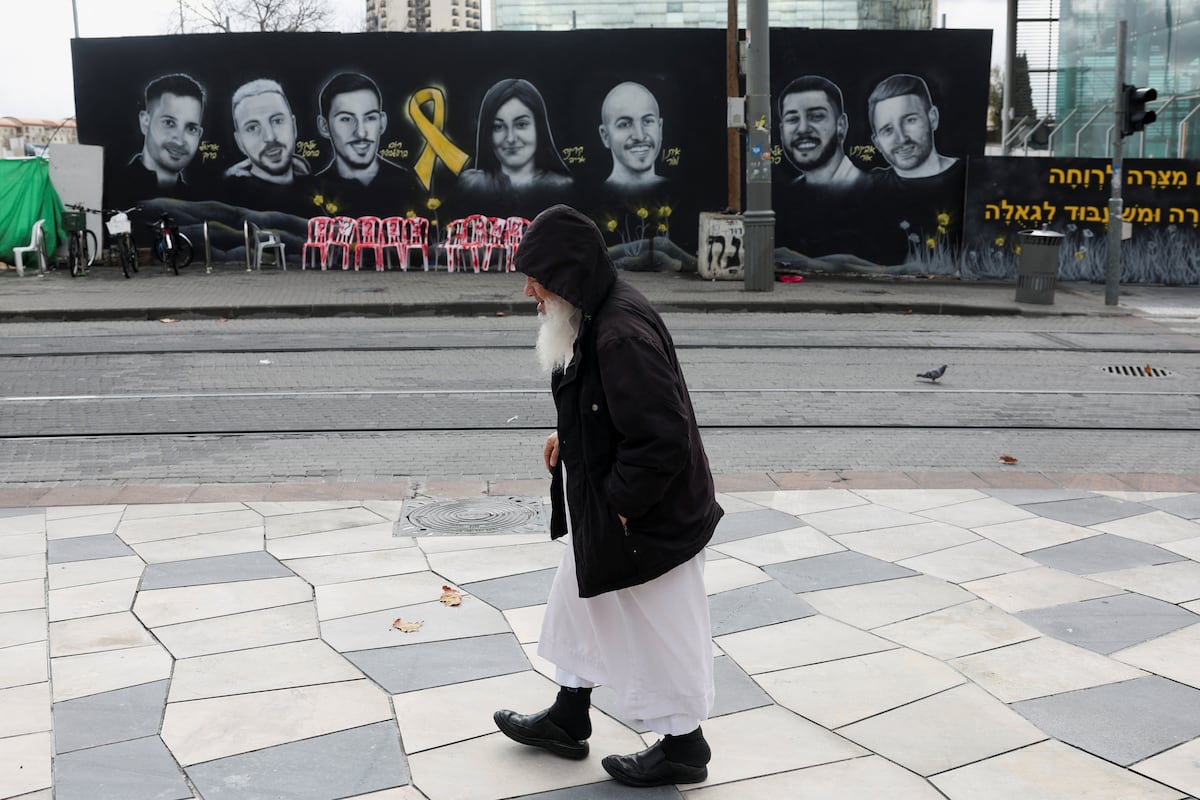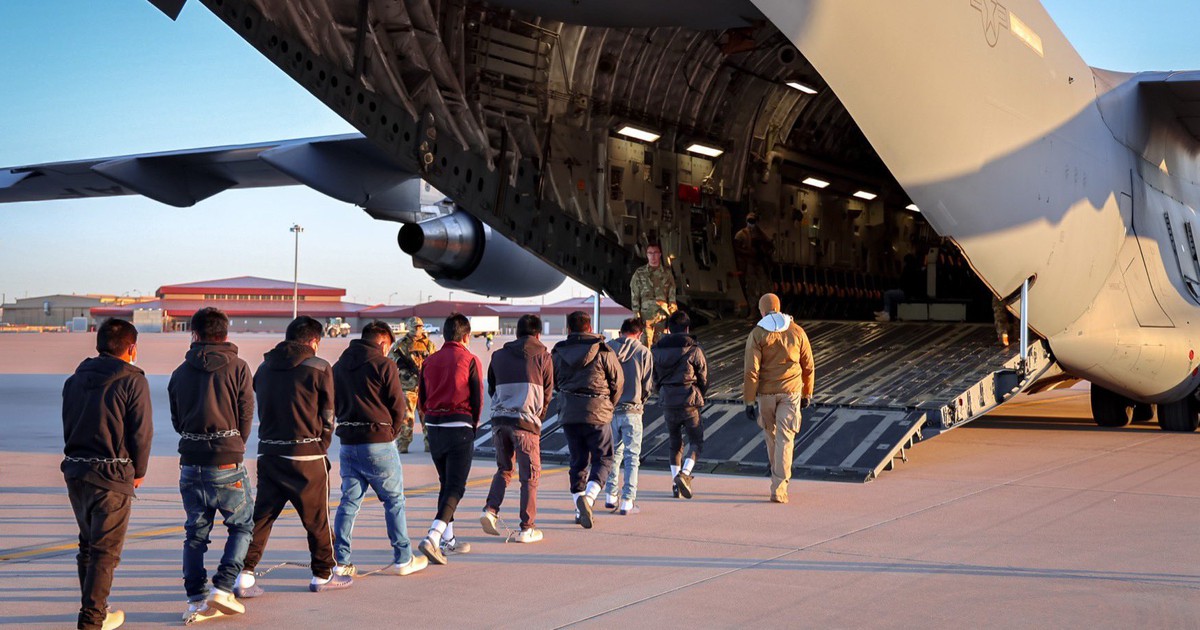It had already been raining without respite for seven days, the water was rising higher and higher, when last Tuesday the mayor of Eldorado do Sul warned his 42,000 residents that the time had come. General evacuation. He ordered everyone to leave their homes immediately, to flee because the water would flood the city for 10 more days. Rio Grande do Sul, in southern Brazil, the richest, is experiencing a roller coaster of torrential rains and droughts because tropical and polar air masses collide above it. However, it has never experienced a rain storm as devastating as the one that began 12 days ago and shows no sign of abating.
Rains, it pours. The gauchos, the residents of this State, have suffered three floods in eight months. On May 2, Thalia Silveira, 21, was taking care of her two cousins in Eldorado do Sul when the flood hit. Neighbors encouraged her to flee. They arrived at a shelter, but had to leave soon because the atmosphere was very tense: “There were people drinking and fighting.” “Now it’s time to work on the reconstruction. We are alive. And it is the most important thing,” Silveira said resigned days later in one of the few points of the city afloat, a section of the BR-290 highway converted into a meeting point to be evacuated by boat or helicopter.
Practically, the entire State – birthplace of Gisele Bündchen and Ronaldinho, bordering Uruguay and Argentina – is flooded. In many places the water reached the roof. It devastated everything. Almost 340,000 people have left their homes, some mayors are considering moving their cities to rebuild them in higher places, countless families have lost everything. “Some are considering emigrating, becoming climate refugees,” says Natalie Unterstell, president of the climate policy study center Talanoa, on the phone. “This could be our Hurricane Sandy or Katrina moment,” she adds. This calamity that exposes the fragility of infrastructure makes politicians and citizens understand that nature does not forgive aggression and that it is essential to act now. Without excuse or delay.
President Luiz Inácio Lula da Silva reacted quickly. He visited the area twice, mobilized the Government, announced important economic aid and proclaimed that these floods “are a warning to the world. We must keep in mind that the Earth is taking its toll on us.” The veteran Lula knows well that the management of this crisis, in a State that opted for the far-right Jair Bolsonaro in 2022, can define this third term, although his environmental policy is much less ambitious than what Brazilian activists demand, although much more committed and light years away from the denialism of his predecessor.
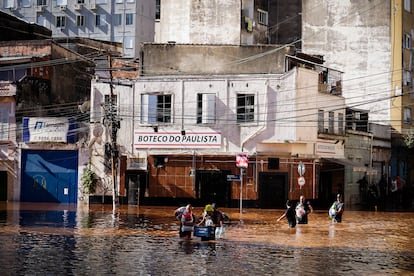
The floods have killed 136 people and another 125 are still missing, according to the latest official report. On the ground, the situation is still extremely critical. Rescue efforts and aid distribution are extremely complicated because the rains washed away roads and bridges. The main airport has been disabled.
Desperation is spreading among the two million affected people – one in every five inhabitants of the State – because two meteorologists predict rain, landslides and winds until Monday the 13th. And, to make matters worse, fake news is making the atmosphere worse with lies like that rescue vessels require special permits. Looting has begun and rescuers are afraid to operate after dark.
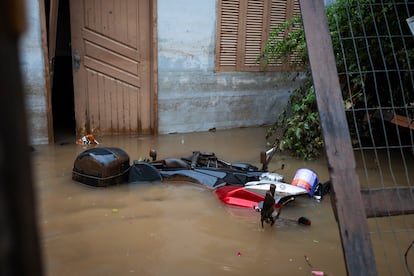
Karina Bruno Lima, 36, researches severe storms and disasters for a doctorate in Climatology at the Federal University of Rio Grande do Sul, a State that can be considered an unbeatable laboratory for the effects of climate change; In the last year she has suffered two more floods, and a cyclone after three years of severe drought. “This disaster occurred due to a combination of factors: El Niño, which brings more rain, a current that brings humidity from the Amazon, an atmospheric blockage with a mass of hot air over the center of Brazil… All that instability was trapped over Rio Grande do Sul. But there is also the human influence. A warmer atmosphere and oceans generate energy for these extreme events,” explains Lima by message, also affected by the storm, without telephone coverage and with a very unstable Internet. 2023 has been the hottest year in millennia.
With global warming, climate disasters are becoming routine. They occur more frequently, are more intense and cause more damage. And, as Lima emphasizes, with the aggravating factor in this case that there are “many cities built next to bodies of water and without any preparation to face extreme events related to rain.”
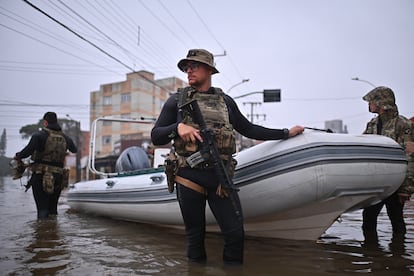
She knows it herself. This scientist has had to leave her home in Porto Alegre, where the containment dikes have not withstood the worst flood since 1941. The streets of the center are now rivers through which lifeguards move by canoe. Lima is sheltered in Passo Fundo, a rural area without risk of flooding 400 kilometers from the capital that became famous throughout the world thanks to participatory budgets.
Lima, also a science communicator, emphasizes that “people have to understand that this requires complex solutions.” That is why she considers it crucial to “elect representatives who prioritize the climate and environmental cause and then hold them accountable.” She insists that it is time for “managers to listen to the warnings that science has been issuing for decades.”
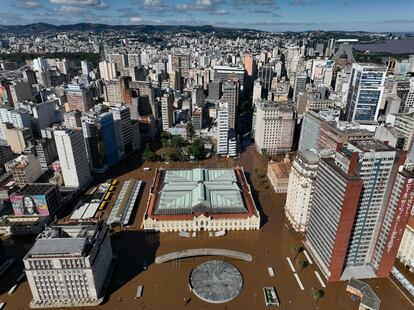
Brazil’s most international singer, Anitta, who performed with Madonna in Rio, directly blames Congress for the Rio Grande do Sul disaster for “passing laws that promote deforestation, pesticides and the invasion of indigenous lands,” according to a video posted on his Instagram account. “In the next election, don’t vote for climate deniers,” she asks her 65 million followers. An important statement five months before the municipal elections. Climate policy specialist Unterstell categorically states that “the war against nature has to stop. “Nature is an ally, it can stop the advance of water.”
This calamity has once again put the focus on the legislative offensive to break environmental regulations and the enormous power of the lobby Brazilian agriculture, a central sector in the economy. Rio Grande do Sul is the fifth largest economy in Brazil, a State with a powerful agricultural sector that produces 70% of the rice, omnipresent with beans on the table of any Brazilian, whether poor or rich. Supermarkets have rationed sales and the Government will import one million tons to avoid shortages and prices from skyrocketing. Lula has taken advantage of the climate catastrophe to insist on his claim that rich countries, which destroyed their forests to industrialize and prosper, support Brazil and others that developed less and that preserved their forests with money and technology.
Both experts insist that, once the emergency phase passes, it is essential to look to the future and quickly adopt mitigation and adaptation policies. That is, one, drastically reduce emissions to stop global warming. And that, the climatologist points out, “is totally incompatible with opening new oil projects,” as Lula considers doing in the Amazon and Petrobras hopes to do. And two, it is necessary to build infrastructure that can withstand increasingly stronger meteorological attacks. “In Porto Alegre, the dikes gave way because there was no maintenance and they did not know how to operate the water pumps!” Unterstell exasperates.
The thousands of officials, police, military and volunteers deployed have managed to rescue more than 70,000 people and 10,000 pets. This, like every tragedy, has its symbol. Here it is not a child, nor a pregnant woman, nor an old man or a lifeguard, but a horse called Candy, who spent six days on a roof in a flooded farm. Discovered by a Globo television helicopter, the next day he was rescued in a major operation that included sedating him and evacuating him in a zodiac. Television and the first lady, Janja da Silva, broadcast it live. The sociologist’s emotion was such that she burst into an appearance by her husband to give him the happy news in person.
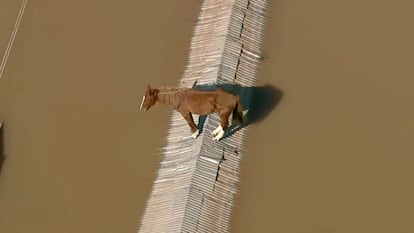
Brazilians breathed a sigh of relief as they continue to mobilize to raise funds and donate aid to their affected compatriots, trying to avoid falling into fraud. There are always heartless people. And while the gauchos beg the sky to stop raining, in the northeast of this continental country they beg for rain and the inhabitants of the center cannot take off the fan because of a heat wave with maximum temperatures above 30 degrees, something unbecoming of tropical autumn.
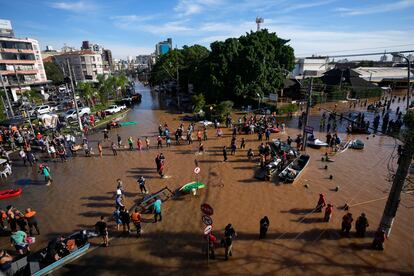
Follow all the information from El PAÍS América in Facebook and xor in our weekly newsletter.

